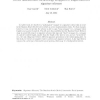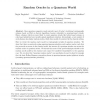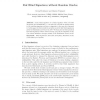29 search results - page 1 / 6 » The Random Oracle Methodology, Revisited |
137
click to vote
CORR
2000
Springer
15 years 2 months ago
2000
Springer
We take a critical look at the relationship between the security of cryptographic schemes in the Random Oracle Model, and the security of the schemes that result from implementing...
113
click to vote
TCC
2004
Springer
15 years 7 months ago
2004
Springer
In earlier work, we described a “pathological” example of a signature scheme that is secure in the Random Oracle Model, but for which no secure implementation exists. For that...
115
Voted
CORR
2010
Springer
15 years 2 months ago
2010
Springer
Once quantum computers reach maturity most of today's traditional cryptographic schemes based on RSA or discrete logarithms become vulnerable to quantum-based attacks. Hence, ...
163
click to vote
AFRICACRYPT
2010
Springer
15 years 9 months ago
2010
Springer
A fair blind signature is a blind signature with revocable anonymity and unlinkability, i.e., an authority can link an issuing session to the resulting signature and trace a signat...
119
Voted
CRYPTO
2003
Springer
15 years 7 months ago
2003
Springer
We revisit the definitions of zero-knowledge in the Common Reference String (CRS) model and the Random Oracle (RO) model. We argue that even though these definitions syntacticall...



